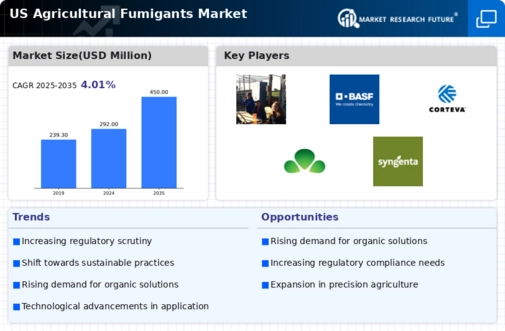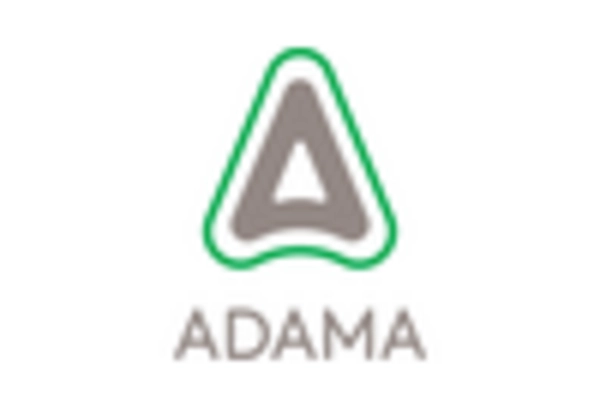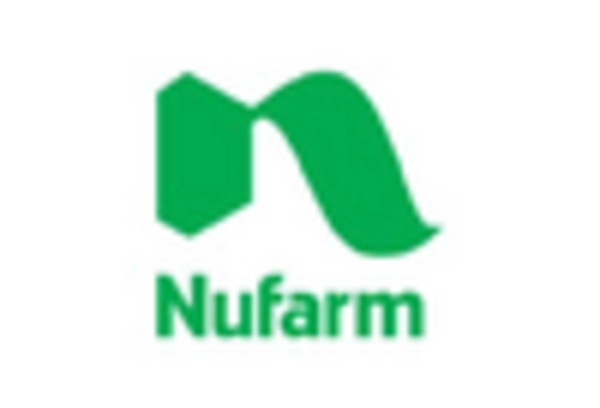Rising Demand for Food Security
The agricultural fumigants market is experiencing a notable increase in demand driven by the urgent need for food security. As the global population continues to grow, the pressure on agricultural production intensifies. In the US, the agricultural sector is projected to expand, necessitating effective pest control measures to protect crops. The market for agricultural fumigants is expected to grow at a CAGR of approximately 5.2% from 2025 to 2030. This growth is largely attributed to the increasing adoption of fumigants to ensure higher yields and quality produce, thereby addressing food scarcity concerns. Farmers are increasingly recognizing the importance of using agricultural fumigants to mitigate losses caused by pests and diseases, which further propels the market forward.
Regulatory Support for Fumigant Use
Regulatory frameworks in the US are evolving to support the use of agricultural fumigants, which is a significant driver for the market. Government agencies are recognizing the importance of fumigants in maintaining agricultural productivity and food safety. Recent policy initiatives aim to streamline the approval process for new fumigant products, thereby encouraging innovation and adoption. The market is expected to benefit from these supportive regulations, which may lead to an increase in participation by manufacturers. Furthermore, the alignment of fumigant use with sustainable agricultural practices is likely to enhance the market's growth prospects, as farmers seek compliant solutions that meet both regulatory standards and environmental considerations.
Increased Awareness of Pest Resistance
The agricultural fumigants market is significantly influenced by the growing awareness of pest resistance among farmers. As pests evolve and develop resistance to conventional pesticides, the need for effective fumigation solutions becomes paramount. This awareness drives the demand for agricultural fumigants that can combat resistant pest populations. In the US, it is estimated that crop losses due to pest resistance could reach $10 billion annually if not addressed. Consequently, farmers are increasingly turning to fumigants as a reliable method to manage pest resistance, ensuring sustainable crop production. The agricultural fumigants market is likely to see a surge in demand as farmers seek to implement integrated pest management strategies that include fumigation as a key component.
Technological Innovations in Fumigation
Technological advancements play a crucial role in shaping the agricultural fumigants market. Innovations in application techniques and formulations have led to more efficient and effective pest control solutions. For instance, the development of precision fumigation technologies allows for targeted application, minimizing chemical usage while maximizing efficacy. This not only enhances crop protection but also aligns with environmental regulations. The market is witnessing a shift towards more sophisticated fumigants that are less harmful to non-target organisms. As a result, the agricultural fumigants market is likely to benefit from these innovations, with an estimated market value reaching $2.5 billion by 2030. The integration of technology in fumigation practices is expected to improve overall productivity in the agricultural sector.
Global Trade Dynamics and Export Opportunities
The agricultural fumigants market is also influenced by global trade dynamics, particularly in the context of export opportunities for US-produced fumigants. As international markets expand, US manufacturers are increasingly looking to export their products to meet the rising demand for effective pest control solutions worldwide. The agricultural fumigants market is projected to see a growth in exports, with estimates suggesting a potential increase of 15% in export volumes by 2030. This trend is driven by the need for effective fumigation solutions in regions facing pest challenges. The ability to tap into The agricultural fumigants market.
















